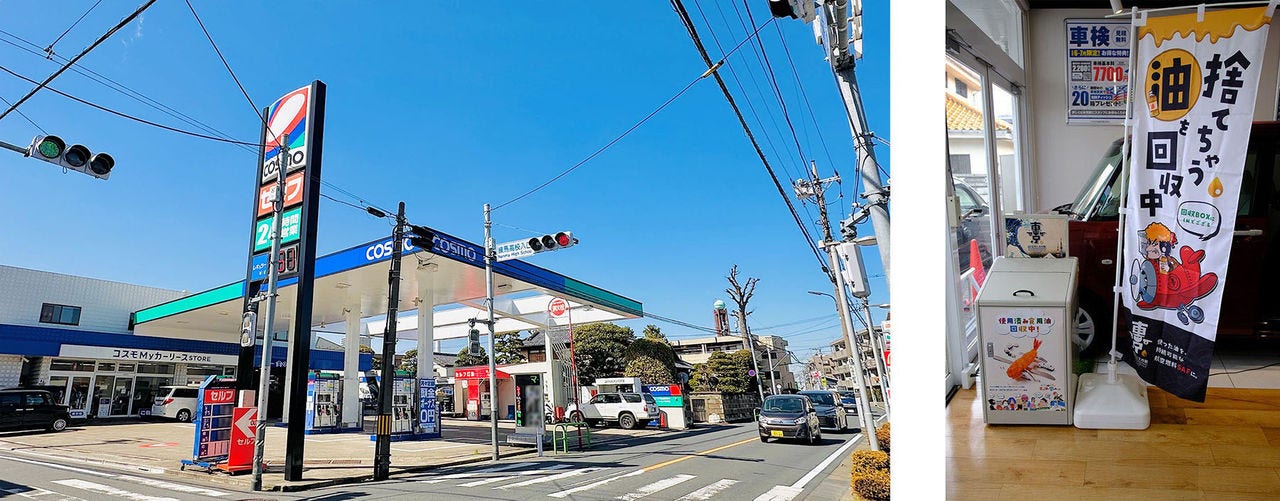Used Cooking Oil Collection Promotion Campaign “Tokyo Fry to Fly Project” Cosmo Oil Kicks Off Pilot Initiative to Collect Household Cooking Oil at Service Stations for Use in Production of Japan’s First SAF
June 24, 2024
Cosmo Oil Co., Ltd.
Cosmo Oil Marketing Co., Ltd.
Cosmo Oil Sales Corporation
Cosmo Oil Co., Ltd (hereinafter, "Cosmo Oil"), in partnership with the Tokyo Metropolitan Government, JGC Holdings Corporation (hereinafter "JGC HD"), and Revo International Inc. (hereinafter,"Revo International"), is running the "Tokyo Fry to Fly Project ("the Campaign")," a campaign to collect used cooking oil for use as feedstock in the production of Sustainable Aviation Fuel (SAF). The Campaign is part of efforts to achieve a "Zero Emission Tokyo" to contribute to the realization of net zero global CO2 emissions by 2050.
As part of the Campaign, Cosmo Oil, Cosmo Oil Marketing Co., Ltd. (hereinafter, "Cosmo Oil Marketing"), and Cosmo Oil Sales Corporation (hereafter, “Cosmo Oil Sales”), in cooperation with JGC HD and Revo International, will today (June 24) launch a pilot initiative to collect household used cooking oil at service stations (gas stations), with the aim of using it as feedstock to produce Japan’s first SAF.
<Pilot initiative background>
To address the universal issue of global warming, it is crucial to consider what actions individual households can take and engage in activities to educate and spread awareness throughout society. In this pilot initiative, resources (used cooking oil) generated and brought to nearby service stations by citizens will be reused to produce SAF. This pilot was launched to allow citizens to experience firsthand how they can contribute to decarbonization and resource recycling in their daily lives.
<Pilot initiative overview>
1.Pilot period June 24, 2024 - August 31, 2024
2.Collection points
| (1) | Self-service & Car Care Station Hikarigaoka (Nerima-ku) |
| Address: 5-9-1 Tagara, Nerima-ku, Tokyo 179-0073 (TEL: +813-6878-4266) | |
| (2) | Self-service & Car Care Station Nakano Testugakudo (Nakano-ku) |
| Address: 1-7-3 Egota, Nakano-ku, Tokyo 165-0022(TEL: +813-6878-4265) | |
| (3) | Self-service & Car Care Station Shibaura(Minato-ku) |
| Address: 3-17-12 Shibaura, Minato-ku, Tokyo 108-0023(TEL: +813-6878-4264) |

Photo of installed used cooking oil collection box (Self-service & Car Care Station Hikarigaoka)
3.Pilot initiative flow
| Use: | Household used cooking oil used for deep frying, etc. is poured into a container with a lid, such as a plastic (PET) bottle |
| Collect: | Used cooking oil in a plastic bottle or other such container is placed in the used cooking oil collection box located at service stations |
| Transport: | Used cooking oil is then collected by Revo International and transported to the SAF production plant on the premises of Cosmo Oil’s Sakai Refinery (Sakai City, Osaka) |
| Produce: | SAF is produced at the SAF production plant using transported used cooking oil as feedstock1 |
| Use: | SAF is loaded onto aircrafts and used as aviation fuel |

For details of collection box locations and collection procedures, please refer to the following link.
Based on insights gathered from this pilot, the parties will pursue a full-scale rollout of their used oil collection initiative starting in September of this year, with plans to gradually expand it to other service stations in Tokyo.
Cosmo Oil, Cosmo Oil Marketing, Cosmo Oil Sales, JGC HD, and Revo International are set to accelerate business development to establish a SAF supply chain. Concurrently, the parties intend to build momentum for resource recycling towards decarbonization in Japan and to establish a framework to enable the supply of locally-made SAF in 2025, when global interest in SAF is expected to grow a result of Expo 2025 Osaka, Kansai, Japan.
【About the Tokyo Metropolitan Government Used Cooking Oil Collection Promotion Project】
The Tokyo Metropolitan Government is promoting a shift to use of sustainable resources, with the aim of achieving a "Zero Emission Tokyo" to contribute to the realization of net zero global CO2 emissions by 2050. The aviation industry is working to achieve carbon neutrality by 2050 through the procurement and use of SAF but it faces challenges in sourcing feedstock such as biomass.
To expand the collection of used cooking oil for use as SAF feedstock and support the establishment of a new supply chain that facilitates SAF production, the Tokyo Metropolitan Government concluded a partnership agreement with JGC HD, Cosmo Oil, and Revo International in August 2023. This was pursuant to selection of their joint proposal submitted in response to a public call for proposals to promote the collection of used cooking oil in April 2023.
For details, please refer to the following link.
【About the Project for Large-scale Production of Japan’s First Locally-made SAF】
Cosmo Oil, JCG HD, and Revo International have jointly explored commercialization towards establishment of a supply chain, encompassing the domestic collection of used cooking oil through the production, transportation, and supply of SAF. Having established a new company, Saffaire Sky Energy LLC in 2022, the parties aim to supply approximately 30,000 kiloliters of SAF per year. This SAF will be made solely from used cooking oil generated in Japan. Furthermore, this project was selected to receive a subsidy by the New Energy and Industrial Technology Development Organization (NEDO)2.
1 Currently, construction of a SAF production line is underway on the premises of Cosmo Oil’s Sakai Refinery (Sakai City, Osaka). Collected used cooking oil will be used by Revo International to produce biodiesel fuel until the line becomes operational at the start of 2025.
(End)
(The official language for Cosmo Energy Group's filings with the Tokyo Stock Exchange and Japanese authorities, and for communications with our shareholders, is Japanese. We have posted English versions of some of this information on this website. While these English versions have been prepared in good faith, Cosmo Energy Group does not accept responsibility for the accuracy of the translations, and reference should be made to the original Japanese language materials.)